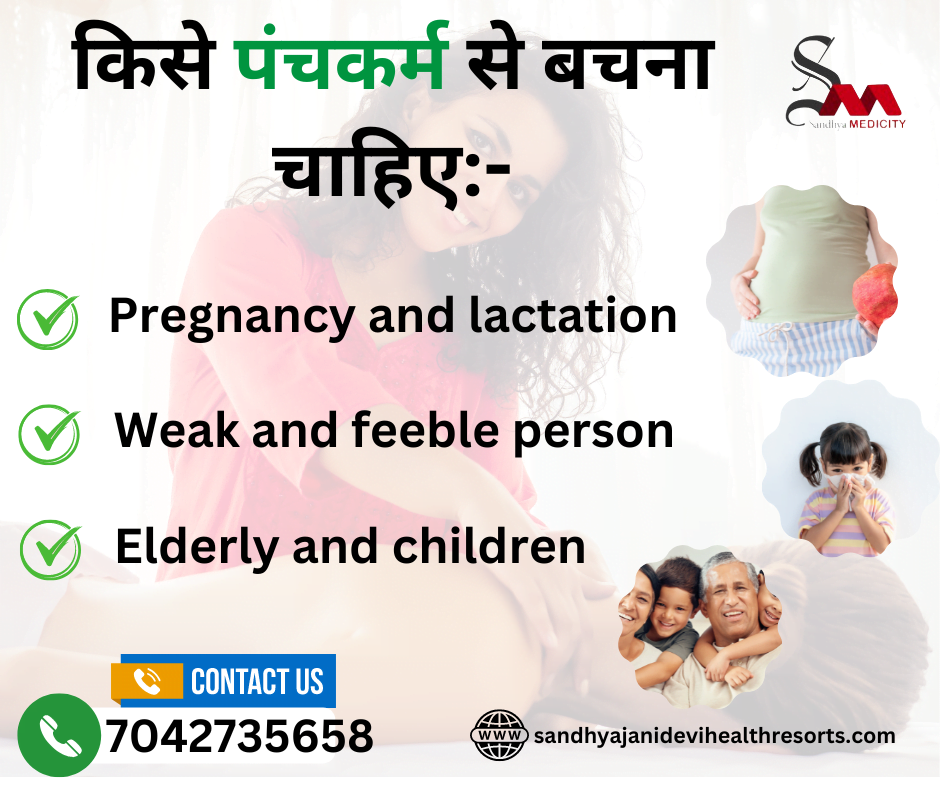We will discuss an interesting topic that is often overlooked when discussing the ancient Ayurvedic method of should not be Panchakarma. Join me Who Should Not Get this Brace yourself for some compelling insights that challenge the conventional wisdom surrounding this rejuvenating treatment.

Define panchakarma
Let us briefly understand what is involved in Panchakarma. In, which is derived from the Sanskrit words “Pancha” meaning five, and “karma” meaning actions, is a detoxification and cleansing process that aims to restore balance to the mind, body, and spirit.
It consists of five core procedures designed to eliminate toxins and restore vitality: vamana (vomiting), virechana (purgation), Basti (enema), nasya (nasal administration), and raktamokshana (bloodletting).
Who should avoid Panchakarma
While This is an incredible therapeutic practice, it should be noted that it is not suitable for everyone. Contrary to popular belief, there are certain situations and individuals that should be avoided while undergoing That. Let’s take a closer look at who these individuals are and in what specific situations caution is warranted.
Pregnancy and lactation
Pregnant mothers and lactating women should avoid Panchakarma. During pregnancy, the body is constantly adapting to support the growing fetus, and initiating intensive detoxification processes can potentially disrupt this delicate balance.
Additionally, many of the herbs and oils used in Panchakarma may not be considered safe for consumption during pregnancy or breastfeeding. We always advocate for the well-being of both the mother and the child.
Weak and feeble person
Panchakarma is a transformative process that involves physical, mental and emotional changes. Consequently, people who are already weak or debilitated should avoid this treatment.
Panchakarma is an intense and demanding experience that requires a certain level of stamina and flexibility. If a person’s body is already damaged, doing panchakarma can cause further physical stress, causing imbalance rather than restoration.
Any serious medical condition
It is important to emphasize that Panchakarma is not a substitute for medical treatment. Anyone suffering from acute medical conditions such as infections, inflammatory diseases or acute organ disease should consult a qualified health care professional before considering Panchakarma. Remember, your health should always be your top priority.
Severe psychological disturbance
Apart from physical health, mental wellness is also an integral part of overall health.
Panchakarma not only involves physical detoxification but also a deep emotional release. Consequently, individuals with severe psychological disturbances, such as acute anxiety, depression, or post-traumatic stress disorder, should exercise caution when considering panchakarma.
It is essential to address these underlying emotional concerns before embarking on such an introspective journey.
Elderly and children
Our bodies evolve as we age, and the same applies when it comes to getting Panchakarma done. The elderly, especially those with multiple chronic conditions, should perform panchakarma with caution.
Similarly, children have specific physiological needs and should not be subjected to intensive detoxification procedures such as that, unless under the expert guidance of a qualified Ayurvedic specialist experienced in pediatric care.
Conclusion:-
It is important to remember that, This, although a powerful Ayurvedic intervention, is not a one-size-fits-all solution. We must accept the limits and respect the circumstances in which caution is warranted. Always consult a qualified Ayurvedic practitioner who can assess your individual health needs before considering this treatment.
